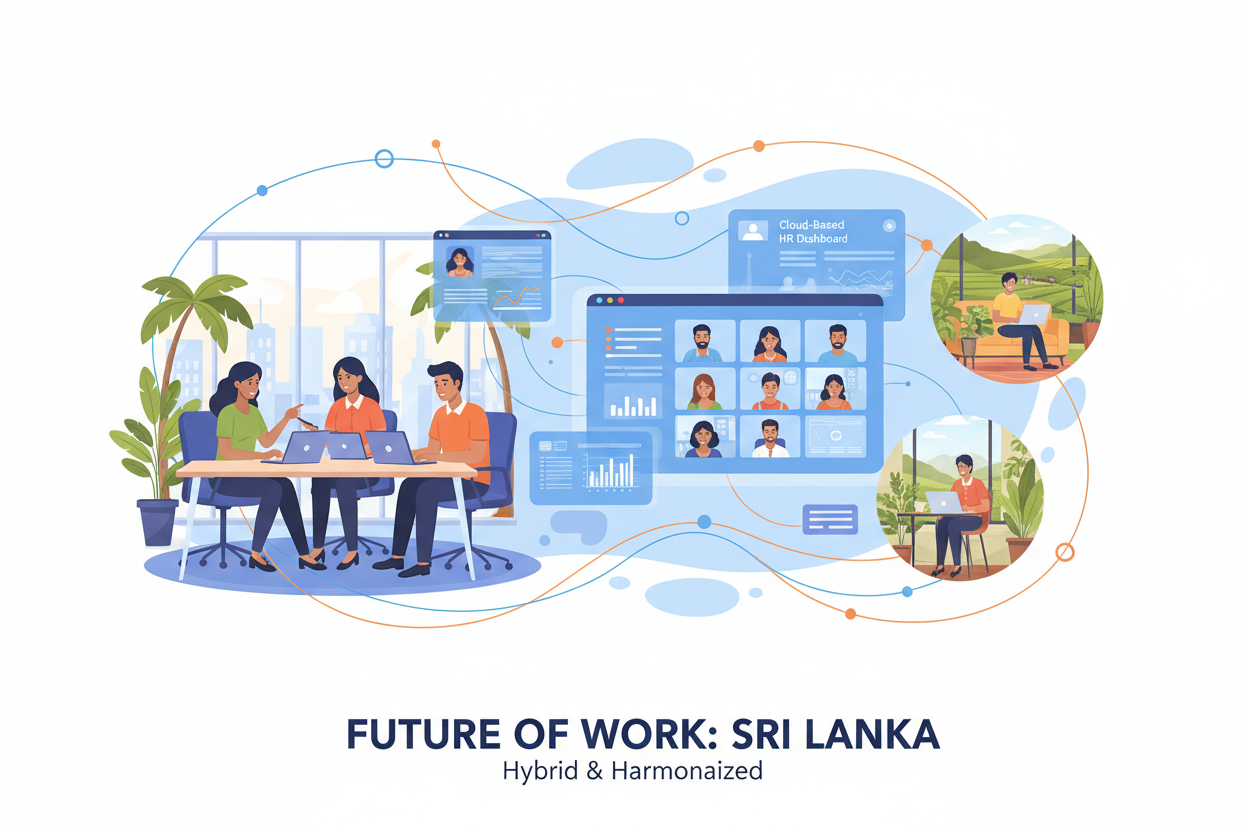Your basket is empty
Already have an account? Log in to check out faster.
Already have an account? Log in to check out faster.

The world of work has changed forever. The traditional 9-to-5 office routine is no longer the only way to get things done. Across Sri Lanka, more businesses are embracing hybrid work — a model that combines the flexibility of remote work with the structure of on-site collaboration.
For HR leaders, this shift brings both new opportunities and fresh challenges. Managing people across different locations requires the right systems, culture, and mindset. And that’s where Gallery HR helps businesses stay organized, connected, and compliant in the new era of hybrid work.
Hybrid work is a flexible model where employees split their time between working from the office and working remotely. It’s designed to offer the best of both worlds — better work-life balance for employees and stronger productivity for businesses.
In Sri Lanka, hybrid work gained momentum after the pandemic and has since become a preferred setup in industries like IT, design, media, finance, and professional services. Employees value the freedom, while companies enjoy reduced overhead costs and improved employee satisfaction.

Hybrid work is more than a trend — it’s a strategic advantage. Here’s why it’s reshaping Sri Lanka’s business landscape:
Access to Wider Talent: Companies can hire skilled professionals from anywhere in the country.
Increased Productivity: Employees work in environments that suit their focus and comfort.
Lower Costs: Less office space and commuting mean savings for both employers and staff.
Happier Employees: Flexibility leads to better morale and retention.
However, to make hybrid work truly effective, businesses need a strong HR foundation — clear policies, performance tracking, and tools for collaboration.
While hybrid work sounds ideal, it also creates unique management challenges. Without proper systems, companies risk communication gaps, confusion, and even compliance issues.
Here are some of the biggest challenges HR teams face:
Tracking attendance and productivity: It’s harder to monitor work hours across locations.
Ensuring fair performance evaluations: Remote workers can feel overlooked.
Maintaining company culture: Employees may feel disconnected from their teams.
Handling compliance: Payroll, leave, and labor law updates still apply to all employees, no matter where they work.
To overcome these challenges, businesses need digital HR solutions that bring everything together — from attendance tracking to payroll automation.

Gallery HR helps Sri Lankan companies build an HR system that works for both office and remote employees. It’s not just a tool — it’s a complete HR platform that simplifies communication, compliance, and performance management.
Here’s how:
Smart Attendance Management: Track attendance and work hours online, whether employees clock in from the office or home.
Digital Payroll & Compliance: Automate EPF, ETF, and PAYE contributions with accuracy and transparency.
Performance Reviews Anywhere: Evaluate progress and give feedback directly through the platform.
Centralized Employee Records: Access profiles, leave requests, and documents securely in one place.
With everything digital, HR teams save time, reduce paperwork, and ensure consistency — no matter where employees are working from.

A leading software company in Colombo recently shifted to a 3-days-office, 2-days-remote hybrid model. Initially, HR struggled to monitor attendance, track overtime, and manage leave requests fairly.
After adopting Gallery HR, all attendance and payroll data were synced automatically. Employees could log in remotely, submit leave requests online, and managers could view performance reports in real-time.
The result?
HR workload reduced by 40%.
Payroll errors dropped to zero.
Employee satisfaction improved significantly.
This transformation proved that hybrid work can be seamless when supported by the right technology.
Technology alone isn’t enough — culture plays an equally important role. To succeed in a hybrid setup, companies must foster trust, communication, and inclusion.
Some best practices include:
Setting clear expectations for communication and work hours.
Encouraging regular check-ins between teams.
Recognizing contributions equally, whether remote or on-site.
Promoting well-being programs to keep employees balanced and motivated.
When people feel valued and connected, hybrid work becomes not just a model — but a mindset.

Hybrid work is here to stay, and it’s redefining how Sri Lankan companies operate. The challenge for HR isn’t just managing change — it’s leading it.
With Gallery HR, your organization can streamline hybrid work effortlessly — managing people, payroll, and performance all in one secure, cloud-based system.
No more scattered spreadsheets or missed updates — just smart, connected HR for the modern workplace.
👉 Visit galleryhr.com to learn how Gallery HR can help your business thrive in the hybrid era.

Don’t miss this opportunity to upgrade your HR operations and join the growing list of businesses in Sri Lanka achieving success with GalleryHR.
GalleryHR is committed to helping Sri Lankan businesses thrive with smarter, more efficient HR solutions. Partner with us today and experience the difference.
Join our empire today!































0 comments